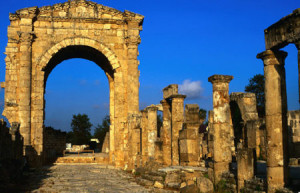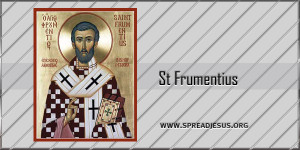The baptism of the Ethiopian eunuch was the fulfillment of the prophecy of David which says; “Ethiopia will quickly stretch out her hands to God” (Act. 8:36; Ps. 68:31). This eunuch was a minister of Candace, Queen of Ethiopia. Later tradition identified the eunuch as the first Gentile convert, and the founder of the Ethiopian Church (Eusebius, hist. Eccl. 2.1.13).
However, there are more narratives that talk about the conversion of the Axum prince and the whole kingdom at the hands of two men from Tyre, Lebanon.


The story of the conversion of Ethiopia is preserved in the writings of the fourth-century Byzantine theologian Rufinius – an authority highly regarded by modern historians. Apparently a certain Meropius, a Christian merchant described by Rufinius as a ‘philosopher of Tyre’, once made a voyage to India, taking with him two Syrian boys whom he was educating in ‘humane studies’. The elder was called Frumentius and the younger Aedesius. On their return journey through the Red Sea the ship was seized off the Ethiopian coast in an act of reprisal against the Eastern Roman Empire which had broken a treaty with the people of the area.
Meropius was killed in the fighting. The boys, however, survived and were taken to the Axumite King, Ella Amida, who promptly made Aedesius his cup- bearer and Frumentius – the more sagacious and prudent of the two – his treasurer and secretary. The boys were held in great honour and affection by the king who, however, died shortly afterwards leaving his widow and an infant son – Ezana – as his heir. Before his death, Ella Amida had given the two Syrians their freedom but now the widowed queen begged them, with tears in her eyes, to stay with her until her son came of age. She asked in particular for the help of Frumentius – for Aedesius, though loyal and honest at heart, was simple.
During the years that followed, the influence of Frumentius in the Axumite kingdom grew. He sought out such foreign traders who were Christians and urged them ‘to establish conventicles in various places to which they might resort for prayer.’ He also provided them with ‘whatever was needed, supplying sites for buildings and in every way promoting the growth of the seed of Christianity in the country.’
At around the time that Ezana finally ascended the throne, Aedesius returned to Tyre. Frumentius for his part journeyed to Alexandria, in Egypt – then a great centre of Christianity – where he informed Patriarch Athanasius of the work so far accomplished for the faith in Ethiopia. The young man begged the ecclesiastical leader ‘to look for some worthy man to send as bishop over the many Christians already congregated.’ Athanasius, having carefully weighed and considered the words of Frumentius, declared in a council of priests: ‘What other man shall we find in whom the spirit of God is as in thee who can accomplish these things?’ He therefore ‘consecrated him and bade him return in the Grace of God whence he came. Frumentius accordingly went back to Axum as Ethiopia’s first Christian bishop and there he continued his missionary endeavours – which were rewarded, in the year AD 331, by the conversion of the king himself. The surviving coins of Ezana’s reign record the transition: the earlier ones bear crescent and disk images of the new and full moon; later examples are stamped uncompromisingly with the cross – amongst the earliest coins of any country to carry this Christian symbol.


Interesting history. Do you have an extra coin with the cross?
Pastor Bernie
Very interesting, Hicham! Praise God that He has in the past and still uses Christians from Lebanon to bring His love and saving Gospel to the world.